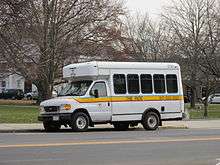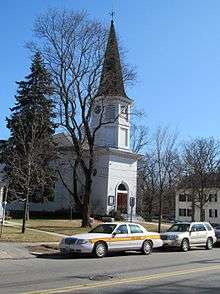The Ride (MBTA)
The Ride (sometimes styled as The RIDE) is the Massachusetts Bay Transportation Authority's ADA paratransit program for people with physical, mental or cognitive disabilities that make it difficult or impossible to ride the MBTA's fixed-route bus, subway, and trolley system. The RIDE provides door-to-door service, from vehicle to door. Using wheelchair accessible vans and four door sedans (cars), drivers (paratransit operators) assist passengers from door to vehicle, take them directly to their destinations, and assist them from vehicle to door. The Ride satisfies requirements under the 1990 Americans With Disabilities Act for transit systems to provide services for those who cannot ride the fixed-route system.[1] The service began in April 1977 with two vehicles.[2]


Unlike the MBTA's fixed-route services, The RIDE trips must be scheduled in advance, typically by 5pm local time the day before. Same-day trip changes and those greater than 3/4 mile from fixed-route services and outside of the core service area are considered premium trips and incur a surcharge.[1] The Ride does not use the MBTA's CharlieCard; instead, passengers must set up an individual account with the MBTA.[1]
In 2016, the MBTA started a pilot program that allows passengers to use a TNC (transportation network company) such as Lyft or Uber a specified number of times per month.[3] This is a curb to curb service rather than door to door service, and there is very limited availability of TNC vehicles with wheelchair lifts. However, there is no need to call and schedule the day before: the TNC trip is set up through a smartphone application. Under this program, for each trip the passenger pays the first $2 or so and the MBTA pays the TNC up to a certain amount. If the total fare is above that amount, the passenger is responsible for the rest of the fare.
The Ride has attracted criticism in recent years for its high operating cost per rider per trip (over $65 USD in 2016) and its inefficient service model. The vendors operating the RIDE are contracted to receive over $40 per trip made minus penalties for lateness. As of July 2019, passengers pay a fare of $3.35 for an ADA regular trip and $5.60 for a non-ADA premium trip. The rest of the cost, over 90%, is covered by the MBTA. [4][5] By policy or regulation, the fare for a trip on The RIDE is kept close to the fare for a trip on an MBTA bus.
Operations
The RIDE program is run by the MBTA, but actual service is contracted out to two separate companies and organizations in the Greater Boston area to run the service: NEXT (National Express Transit) and VTS (Veterans Transportation Services). Additionally, all call center services including reservations, scheduling and dispatch are handled by another vendor, currently Intelliride, a subsidiary of Transdev.
The MBTA uses American made vans and sedans for The RIDE and uses the MBTA branding on all its RIDE vehicles. The vendor (company) operating an individual RIDE vehicle was until early 2020 identifiable by a company specific color scheme with stripes running alongside the van. The color scheme is now transitioning to black stripes for all service providers, namely NEXT and VTS as of July 2020. Requests for a preferred vehicle type for individual trips are not honored.
MBTA's the RIDE services all areas serviced by MBTA bus routes. In March of 2020, transfers between service providers were stopped temporarily during the COVID-19 pandemic of 2020 for health reasons and in June 2020, the MBTA decided to make that change permanent. Both service providers, NEXT and VTS, provide the RIDE service in all of the RIDE service area.
2017 Transition of Call Center Operations
Until early 2017, the Ride client (passenger or designee) called one of three Ride service providers who each maintained their own call center.
In 2017, the MBTA started consolidating reservations, scheduling and dispatching for all three vendors into one centralized call center called TRAC, which stands for "The RIDE Access Center." The MBTA hired Global Contact Services (GCS) to run TRAC out of an office facility in Medford, Massachusetts. In January 2017, TRAC took over the call center duties for the RIDE from NEXT. In April of the same year, TRAC took over call center duties from GLSS. The VTS (Veterans) call center was to transition next to TRAC. However, VTS retained its call center through 2017, partly because of issues the MBTA had with the vendor GCS running the TRAC center. The MBTA hired another vendor, Intelliride/Transdev, to take over the TRAC center in the summer of 2018, and VTS transitioned its call center functions into TRAC shortly thereafter.
2020 Transition of RIDE Service Providers
The MBTA in general awards RIDE contracts to Service Providers(a.k.a. Vendors, Contractors, Companies) every five years, and the next five year contract cycle began in January of 2020. In September of 2019, the MBTA offered 50% of RIDE trips to NEXT, 30% to MV Transportation and 20% to VTS for the next contract period after evaluating price points and technical abilities of each vendor.[6] However, MV Transportation decided not to accept the contract offer, and in November 2019, the MBTA awarded 50% to VTS and 50% to NEXT.
GLSS also bid for a contract but did not win an offer. GLSS paratransit operators were notified of a preliminary layoff schedule. However, all three vendors (GLSS, VTS, NEXT) stayed in operation until June 27. NEXT and VTS started looking for satellite locations in the Fall of 2019 to accommodate the anticipated extra vehicles and personnel needed for the increased percentage of RIDE trips. VTS opened facilities in Everett and Watertown in the Spring of 2020, and NEXT announced plans to open its own facility in Quincy in the Summer of 2020. Many GLSS paratransit operators joined VTS, and a few others joined NEXT. Much of the transportation department management team at GLSS joined VTS.
Until June of 2020, each separate company/vendor/service provider was assigned a geographic region where no other vendor was allowed to operate. All three vendors/service providers served the immediate Boston area, namely Boston, Brookline, Cambridge and Somerville. When a RIDE passenger was picked up or dropped off in a community outside of the immediate Boston area, the company assigned exclusively to that community was used to transport that passenger. For example, someone going from Boston to Dorchester (which is still part of Boston could use any company, but someone traveling from Boston to Saugus would have to use GLSS for this trip. Someone going from Lynn to Norwood, however, would have to use GLSS then transfer within Boston to a NEXT operated Ride vehicle to get to Norwood.
On June 14, 2020, the MBTA changed the RIDE policy to eliminate vendor assigned geographic areas and transfers between vendors. As a result, VTS and NEXT started to provide the service to all of the Ride service areas previously assigned to other vendors. The transfer locations at Ruggles Station in Roxbury, Massachusetts, Oak Grove Station in Malden, and Spring Street/Charles River Loop in West Roxbury ceased to be used for transfers between Ride vendors. In other words, NEXT drivers are now operating in North Shore and north suburban Boston communities such as Marblehead, Salem, Revere, Reading, Burlington and Arlington as well as the central Boston vicinity (Boston, Brookline, Cambridge, Somerville), south suburbs and the South Shore. Also, VTS drivers are now operating in South Shore and North Shore communities such as Quincy, Randolph, Sharon, Swampscott, Salem and Lynn as well as the central Boston vicinity, north and northwest suburbs. As of 8/3/2020, the MBTA website still erroneously shows GLSS as an active vendor, and the service area map has not been updated to reflect the change in vendors and assigned areas.[7]
Criticism
The program has been criticized for its high cost to the MBTA, particularly since much of the MBTA was made accessible in the past three decades.[8] During discussions of potential major fare increases and service cuts in 2013, the program's high cost per rider was cited as waste.
As of November 2019, all MBTA Bus routes, Orange Line stations and Red Line stations are accessible as are all but one Blue Line station, all but one Mattapan Trolley stop, most Green Line stations, and most commuter rail stations.[9][10] Many Ride customers use a combination of regular MBTA bus, train and trolley as well as the RIDE paratransit service especially within the core communities of Boston, Brookline, Cambridge and Somerville. Despite this, the number of Ride users and the number of daily Ride trips continue to increase every year. The MBTA has partially addressed the issue of cost by instituting programs where certain RIDE users can use lower cost TNC (technology network company) rides (e.g., Lyft, Uber) which provide curb to curb service.
2020 VTS Strike
Effective June 27, 2020, VTS and NEXT began covering the catchment area previously served by GLSS. Many former GLSS drivers became VTS employees at this time.
On July 12, 2020, the drivers voted to strike over health benefits. Teamsters Local 25 had been negotiating a new contract with VTS for several weeks before it expired at the end of June. Due to the fact it is difficult to socially distance in The RIDE vehicles and that some passengers require more physical assistance than others, the drivers are very concerned about protecting their health during the COVID-19 epidemic.[11]
In April 2020, The RIDE discontinued shared rides to protect passengers and drivers during the pandemic. However, once the strike began the MBTA stated “Due to a shortage of drivers, shared trips on The RIDE will temporarily resume. Customers should expect to be on vehicles at the same time as other customers.”[12]
On July 19, 2020, after being on strike for eight days, Veterans drivers approved a new contract with 90% of the vote.[13]
References
- "THE RIDE Paratransit Program". Massachusetts Bay Transportation Authority. Retrieved 11 July 2013.
- "MBTA Marks The RIDE's 25 Years of Service" (PDF). TRANSReport. Boston Metropolitan Planning Organization. May 2002. Archived from the original (PDF) on 16 January 2011. Retrieved 6 February 2014.
- https://www.mbta.com/accessibility/the-ride/on-demand-pilot
- Katz, Bob; et al. (December 2011). "RIDE Program Review – Final Report" (PDF). Financial Analysis and Control Technology Services LLC. Retrieved 11 July 2013.
- Quinn, Colleen (21 February 2012). "Inspector General recommends money savers for costly MBTA Ride program". MetroWest Daily News. Retrieved 11 July 2013.
- https://cdn.mbta.com/sites/default/files/2019-09/2019-09-23-fmcb-M-ride-dedicated-service-provider-procurement.pdf
- https://www.mbta.com/accessibility/the-ride/service-area-and-providers
- Wells, Jonathan (21 February 2011). "I-Team: 'The Ride' Breaking MBTA's Budget". CBS Boston. Retrieved 9 October 2011.
- https://www.mbta.com/stops/commuter-rail#commuter-rail-tab
- https://www.mbta.com/stops/subway#subway-tab
- Reed, Matt (July 13, 2020). "Strike impacting service on MBTA's Ride program". WCVB. Retrieved 18 July 2020.
- "The RIDE". MBTA. Retrieved 18 July 2020.
- "Drivers From MBTA's The Ride End 8-Day Strike, Approve New Contract". CBS Boston. July 19, 2020. Retrieved 20 July 2020.